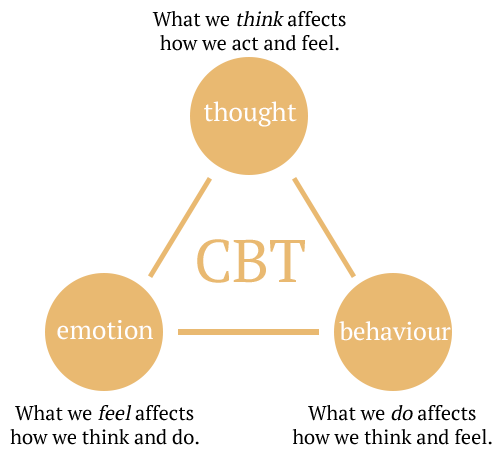Cognitive Behaviour Therapy (CBT)
“What really frightens and dismays us is not external events themselves, but the way in which we think about them. It is not things that disturb us, but our interpretation of their significance.”
– Epictetus
CBT is a structured and generally short-term treatment (6-12 sessions) where the goal is to teach clients that they can take control of how they interpret and deal with their situations.
CBT operates under the premise that our thoughts (cognitions), emotions, behaviours, and physical sensations are interconnected and, more specifically, that our thoughts determine our emotions and behaviour.
When she thinks of her dates, thoughts such as “What if he doesn’t like me when we meet? I am not interesting / attractive enough. What if he doesn’t not contact me after our date…? I will never have a relationship!” are running in her mind. This kind of thoughts trigger
negative emotions in her. She experiences anxiety as more and more negative thoughts pop up in her mind which has a negative effect on her behaviour. Because of her anxiety and worries, she cancels her date, which is not helpful considering her goal to find a partner.
In the process of therapy, we explored the link between her thoughts, emotions, and
behaviour. She became more reflective and aware of her thoughts and learned that it is not dating (an external event) that triggers her anxiety but the way she thinks about going on a date that disturbs her.

Click to book an appointment
Therapists explain and/or demonstrate various techniques to clients then suggest that the client practise and apply them in real life situations that are distressing for them. Skills acquisition and homework assignments are what set CBT apart from “talk therapies” (Cully & Teten, 2008). In the session the therapist and the client agree on ‘homework’. The client is expected to work on their assignment outside the therapy room. They might be asked to keep a journal, monitor their thoughts, use rating scales to monitor the intensity of their emotions, and practice relaxation, mindfulness exercises etc.
CBT is an approach that uses the evidence from research and clinical studies to formulate best practices. Research demonstrates that CBT is effective in treating a wide range of emotional and behavioural problems such as depression (Watkins, 2018; Hawley, Padesky et al., 2016)), anxiety (Unwin, Tsimopolou et al., 2016), phobias (Molbach et al., 2020), addiction (Bador & Kerekes, 2020), and insomnia (Van Der Zweerde et al., 2019) to name just a few.
